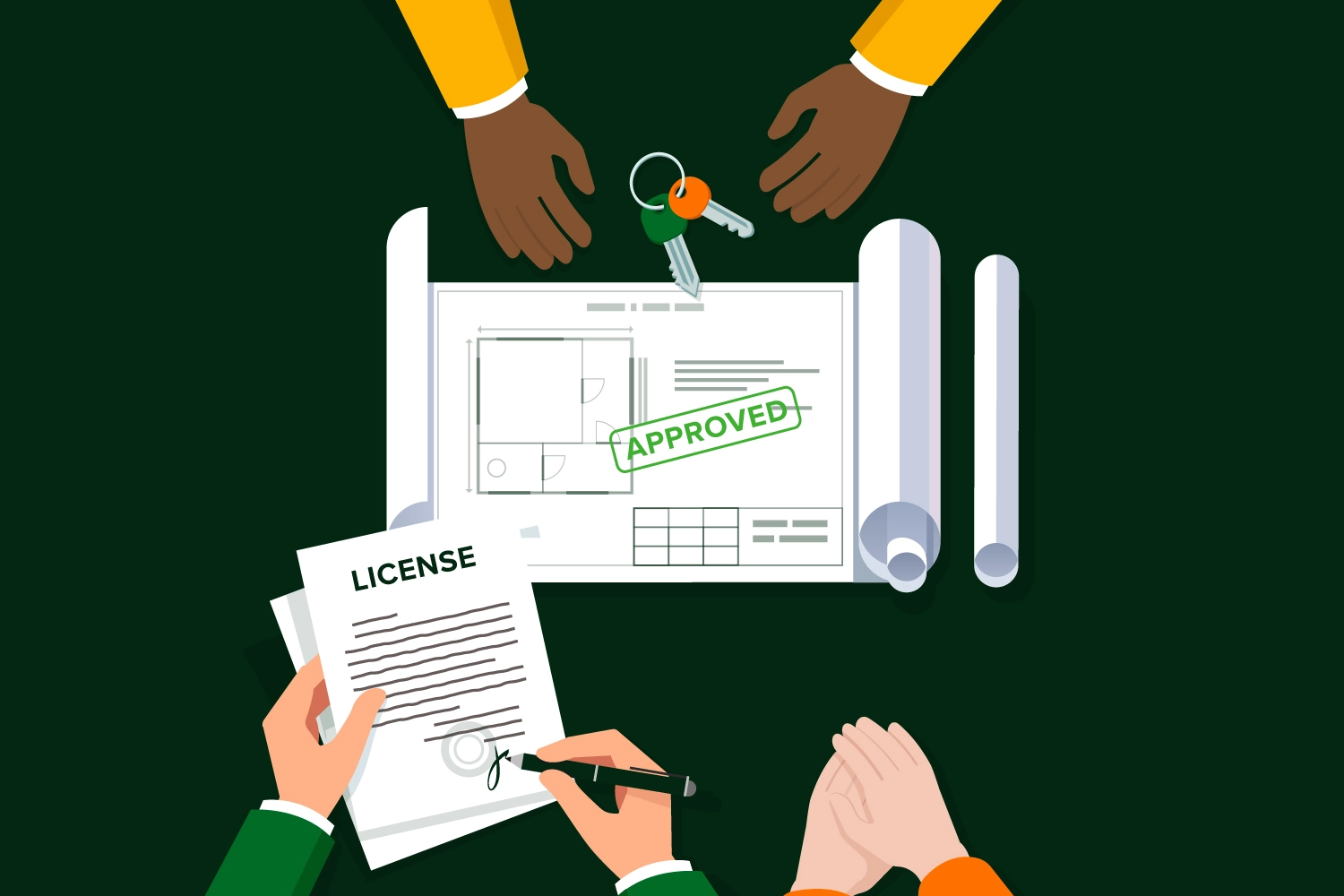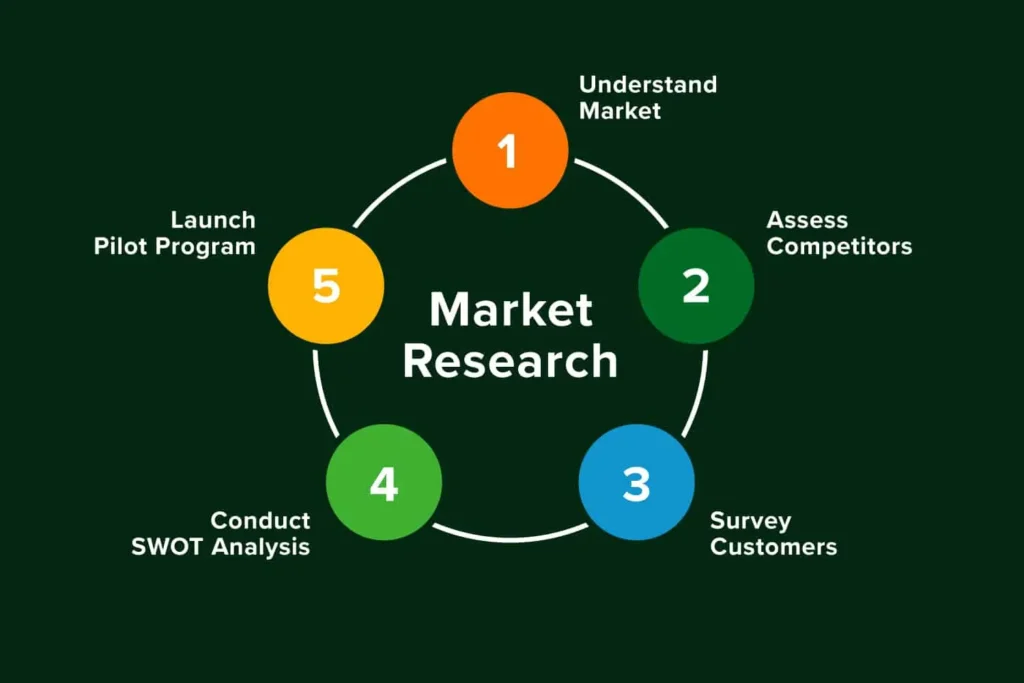Disclaimer: The articles published here on the City of Eau Claire Economic Development Division website are meant to be a helpful starting point as you explore doing business in our community. They’re not the final word on rules, requirements, or what’s best for your unique situation. We always recommend checking in with legal, financial, or other professionals for advice tailored to your business.
So, you’ve got a big idea, a business plan, maybe even a storefront in mind. Before you flip the sign to “Open” though, there’s one crucial step you can’t skip: making sure your business is properly licensed and permitted. But where do you start, and what applies to your business? That’s one of the questions the City of Eau Claire gets most often from entrepreneurs, so we’ve put together this helpful guide to help you cut through the confusion and get everything squared away.
Let’s break it down, step by step.
Step #1: Register Your Business Name
The name of your new business name is how people will come to know you, remember you, and talk about you. But before you print business cards or set up a Facebook page, make sure your name is legally registered and available for use in Wisconsin.
If you’re starting a sole proprietorship or partnership and plan to operate under a name that isn’t your own legal name, you’ll need to file a Trade Name—also known as a “Doing Business As” (DBA)—with the Wisconsin Department of Financial Institutions (DFI). This lets the public (and the state) know who’s behind the business name.
How it works:
- If your business’s name is different than your name, you’ll need to file a DBA for your business’s name.
- If you’re forming an LLC or corporation, your name will be registered as part of that process, so you can skip this extra step.
Before filing, search the DFI name database to make sure your desired business name isn’t already taken. This will help you avoid confusion and potential legal headaches down the road.
Try searching several variations of your name idea; if the name is too close to another business, it might be rejected. If your name is available, you can file your Trade Name online through the DFI’s portal. There’s a small filing fee (usually around $15), and approval generally comes through pretty quickly. Consider reserving your domain name and social media handles as soon as your business name is secured too! It’s all part of building a recognizable brand from day one.
Step #2: Form Your Legal Business Structure
Before you can move forward with licenses, permits, or even opening a business bank account, you’ll need to decide how your business will be structured. This step has big implications for everything from how you pay taxes to how much personal liability you take on.
Here are the most common business structures in Wisconsin:
- Sole Proprietorship – Simple and inexpensive to start. You and the business are legally the same, which means you’re personally liable for any business debts.
- Partnership – Similar to a sole proprietorship, but with two or more owners. Still relatively simple, but shared liability.
- Limited Liability Company (LLC) – A popular choice for small businesses because it offers liability protection while keeping things flexible. Profits can pass through to your personal taxes.
- Corporation (Inc.) – More complex but offers the strongest liability protection. Corporations are separate legal entities and have different tax rules.
- Nonprofit Organization – Created for charitable, educational, or community-based missions. Nonprofits must register with the state and apply for tax-exempt status with the IRS.
If you’re not sure which structure is best for you, it’s worth chatting with an accountant or attorney before filing.
Once you’ve picked your structure, you’ll need to register with the Wisconsin Department of Financial Institutions (DFI) if you’re forming an LLC, corporation, or nonprofit. Sole proprietorships and general partnerships do not need to register with the state, though you may still need a DBA (see Step #1).
What to expect:
- LLCs file Articles of Organization
- Corporations file Articles of Incorporation
- Nonprofits file Articles of Incorporation (with specific nonprofit clauses)
Once approved, you’ll receive a Certificate of Organization (for LLCs) or Certificate of Incorporation (for corporations and nonprofits). Keep this document in a safe place because you’ll need it when applying for a business bank account, licenses, permits, and sometimes even leases. Depending on your structure, you may need to draft an Operating Agreement (for LLCs) or Bylaws (for corporations). These documents spell out how your business is run and can prevent conflicts down the line.
Step #3: Get a Federal EIN (Unless You’re Exempt)
Think of your Employer Identification Number (EIN) as your business’s Social Security Number—how the IRS identifies your business for tax purposes. Most businesses will need one, even if they don’t plan to hire employees right away.
How to know if you do need an EIN:
✅ You’re forming an LLC, corporation, or partnership
✅ You have (or plan to have) employees
✅ You’ll open a business bank account
✅ You’re applying for business licenses or permits
✅ You plan to file excise taxes or business tax returns
✅ You’re changing your business structure or ownership
If you’re a sole proprietor with no employees and you’re not forming an LLC or partnership, you might be able to operate using just your Social Security Number, but don’t be surprised if some banks and government agencies still require an EIN to work with you. Even if it’s not legally required, it’s usually a good idea to get one anyway.
The online application is free, fast, and available Monday-Friday. You’ll get your EIN immediately after completing the form. Warning: There are websites that look official but charge you to “help” with this process. Don’t fall for them! Applying directly through the IRS is completely free.
Once you get your EIN, save a copy of the confirmation notice and keep it with your other business formation documents. You’ll likely need to reference it when opening a bank account, applying for licenses, or filing taxes.
🔗 Start Here: Internal Revenue Service (IRS) ›
Step #4: Apply for State Licenses & Seller’s Permits
Once you’ve got your federal EIN and business entity in place, it’s time to register with the Wisconsin Department of Revenue (DOR), especially if you plan to sell goods, offer taxable services, or hire employees.
Here are the most common state-level registrations new businesses need:
Seller’s Permit
If you’re making taxable sales of products or services in Wisconsin, you’re legally required to get a Seller’s Permit from the DOR. This allows you to collect and remit sales tax on what you sell.
- Examples of businesses that need one: retailers, restaurants, salons, online sellers, and contractors
- There’s no fee to apply for a Seller’s Permit
- You’ll be required to file regular sales tax returns (monthly, quarterly, or annually depending on your volume)
Wisconsin Withholding Tax Number
If you plan to hire employees, you’ll also need to register for withholding tax with the DOR. This allows you to withhold and remit Wisconsin income tax from your employees’ paychecks.
- Even if you only have one employee, this step is required
- After registering, you’ll be responsible for filing payroll tax reports and payments
This is your go-to resource for registering your business with the DOR and other state agencies. It’s user-friendly and walks you through the process step by step. When you register through the One Stop Portal, you can also take care of multiple state registrations at once, including sales tax, withholding tax, unemployment insurance, and more. It’s a huge time-saver!
Other things to keep in mind:
- If you’re offering professional services (like accounting, cosmetology, or construction), you may need additional occupational licenses through the Department of Safety & Professional Services (DSPS) (see Step #6).
- If you’re running a nonprofit, you may need to register for charitable solicitation through the DFI.
- Some industries, like alcohol sales or tobacco, require special state licenses as well.
Getting your state registrations in order ensures you’re collecting and paying the taxes you’re legally responsible for, and it keeps your business in good standing with Wisconsin agencies. Fortunately, the state has made it pretty simple to handle everything in one place.
🔗 Start Here: Wisconsin One Stop Business Portal ›
Step #5: Check Local City Permits
Here’s where things get more specific and a little more tailored to your exact business type and location. In addition to state and federal requirements, many businesses in Eau Claire need local permits or approvals from the City of Eau Claire or the Eau Claire City-County Health Department.
What you’ll need depends on what you’re doing, where you’re doing it, and how your space is set up.
Building, Remodeling, or Installing Signage?
Whether you’re building from the ground up or just updating a commercial space, you’ll need to connect with the City of Eau Claire Inspections Division. Even if you’re just adding a sign or changing how a space is used (say, turning an office into a retail space), permits may still be required.
They handle permits for:
- New construction
- Interior or exterior renovations
- Electrical, plumbing, and HVAC work
- Sign installation
- Certificate of Occupancy (required before you open to the public)
Opening a Restaurant, Coffee Shop, or Bar?
Food and beverage businesses have a few extra layers of approval to ensure public health and safety.
You’ll need a:
- Retail food license from the Eau Claire City-County Health Department
- Pre-operational inspection to ensure your facility meets health standards
- Liquor license from the City of Eau Claire if you plan to serve beer, wine, or spirits
Liquor licenses come in several types (Class A, B, etc.) and are limited in number, so apply as early as possible. There can be waitlists or council approvals involved.
Running a Home-Based or Mobile Business?
Working from home? Selling crafts or baked goods at pop-ups? Driving a mobile pet grooming van? You might need additional clearances.
Examples include:
- Home occupation permit if you’re operating out of your home and plan to serve customers there
- Zoning compliance letter to confirm your business is allowed in your chosen location
- Temporary use permits if you’re setting up shop at events or markets
Operating a Food Truck or Mobile Vending Business?
If you’re hitting the road with a mobile food unit, you’ll need to work with both the City and the Health Department.
You’ll need:
- Mobile food establishment license from the Health Department
- Inspections of your food truck or trailer
- City of Eau Claire mobile vending license if you plan to operate in public right-of-ways or participate in local events
Getting your local approvals in place early can prevent delays and headaches later on. Whether you’re hanging a sign, scheduling inspections, or applying for licenses, it’s always better to ask questions upfront. When in doubt, give the City a call so we can help you figure out which departments you need to talk to and connect you with the right people.
Step #6: Professional or Industry-Specific Licenses
Depending on the kind of business you’re running and your role in it, you may need a professional or occupational license from the Wisconsin Department of Safety & Professional Services (DSPS). These licenses ensure that individuals working in regulated fields meet specific training, education, and ethical standards.
This step is especially important if you’re offering personal, financial, health-related, or skilled trade services.
Who needs a professional license in Wisconsin?
Here’s a breakdown of some of the most common professions that require DSPS licensing:
- Health & Wellness: Nurses, Physicians, Dentists, Chiropractors, Physical Therapists, Optometrists, Psychologists, Social Workers, Dietitians, Midwives
- Beauty & Personal Care: Barbers, Cosmetologists, Estheticians, Manicurists, Electrologists, Tattooists
- Construction & Trades: Electricians, Plumbers, HVAC Contractors, Asbestos & Lead Abatement Contractors, Elevator Mechanics, Dwelling Contractors, Building Inspectors
- Childcare & Education: Childcare Providers, Teachers, School Administrators
- Finance, Law, & Real Estate: Real Estate Salespersons, Appraisers, Home Inspectors, Accountants (CPAs), Attorneys, Mortgage Bankers
- Other Regulated Professions: Architects, Engineers, Land Surveyors, Funeral Directors, Private Investigators, Pharmacists, Speech-Language Pathologists, Veterinarians
DSPS’s online lookup tool lets you search to see if a license is required for your field and whether you or your employees are properly licensed. Many professions also require continuing education to maintain a license, so be sure to check renewal requirements as well.
Not sure if your profession is regulated? The DSPS website has a full list of the 240+ professions and trades it regulates. If your field isn’t listed, you might still need to comply with local ordinances or obtain certifications through other agencies. If after looking through the list you’re still feeling unsure, reach out to DSPS; they can help you navigate the process.
Getting properly licensed shows customers and clients that you’re serious, trustworthy, and operating by the rules. It’s one of those behind-the-scenes steps that helps build a solid foundation for long-term success.
Step #7: Don’t Forget Fire, Zoning, & Health Inspections
You’ve picked a location, lined up your licenses, and maybe even stocked your shelves… But before you can officially open your doors to the public, there’s one last step: inspections.
Most businesses in Eau Claire, Wisconsin will need some kind of final approval to ensure their space is safe, properly zoned, and compliant with health regulations. These inspections help protect your customers, employees, and your investment. Even if you’re operating a small business, it’s a good idea to call the Fire Department and confirm whether you need an inspection. They’ll also give helpful advice to get your space up to code.
Fire Inspection
If your business serves the public or has employees on-site, you’ll likely need a fire safety inspection by the Eau Claire Fire Department.
This is especially common for:
- Restaurants, bars, and coffee shops
- Retail stores and salons
- Childcare centers
- Manufacturing or industrial spaces
- Multi-tenant office buildings
The inspection will check things like fire extinguishers and exit signage, emergency lighting and clear egress routes, and smoke detectors or sprinkler systems (where required).
Zoning Review & Occupancy Approval
Before opening a new location or even leasing a space, you should verify that your business type is allowed there under the City of Eau Claire’s zoning ordinances.
The City’s Planning Division can help you confirm:
- Whether your business is allowed in your chosen zoning district
- If any Conditional Use Permits are required
- Whether the space meets requirements for parking, signage, and layout
- What kind of Certificate of Occupancy is needed (a must-have for most commercial spaces)
This step is especially important if you’re opening a new business in an existing building, changing the use of a space (e.g., turning an office into a café), or operating a home-based business or mobile business.
Health Inspection
If your business involves food, drink, personal care, or public health, you’ll need approval from the Eau Claire City-County Health Department.
That includes businesses like:
- Restaurants, bars, food trucks, and caterers
- Coffee shops and bakeries
- Grocery or convenience stores
- Tattoo and piercing studios
- Salons and spas
- Lodging facilities (hotels, B&Bs)
- Pools, hot tubs, or other public recreational facilities
You’ll typically need a pre-operational inspection before you open, plus ongoing inspections throughout the year. The Health Department will check things like food storage, handling, and temperature control, sanitation and handwashing stations, equipment layout and cleanliness, and pest control and waste disposal.
Schedule inspections with each division early—ideally before you’ve finished remodeling or setting up your space. Some approvals take time to process, and you don’t want to push back your opening date because you’re waiting for a fire or health inspection. You can usually schedule inspections directly through the relevant City department too. If you’re unsure where to start, the Inspections Division can help connect you with the right people.
Get Started Today
Every business is different, so your exact path may vary. But with a little patience and the right guidance, getting your licenses and permits in order is totally doable. The key takeaway is don’t wait until the last minute. Some approvals can take weeks, and nobody wants to delay their grand opening because of paperwork.
Article Cover Illustration by Freepik





